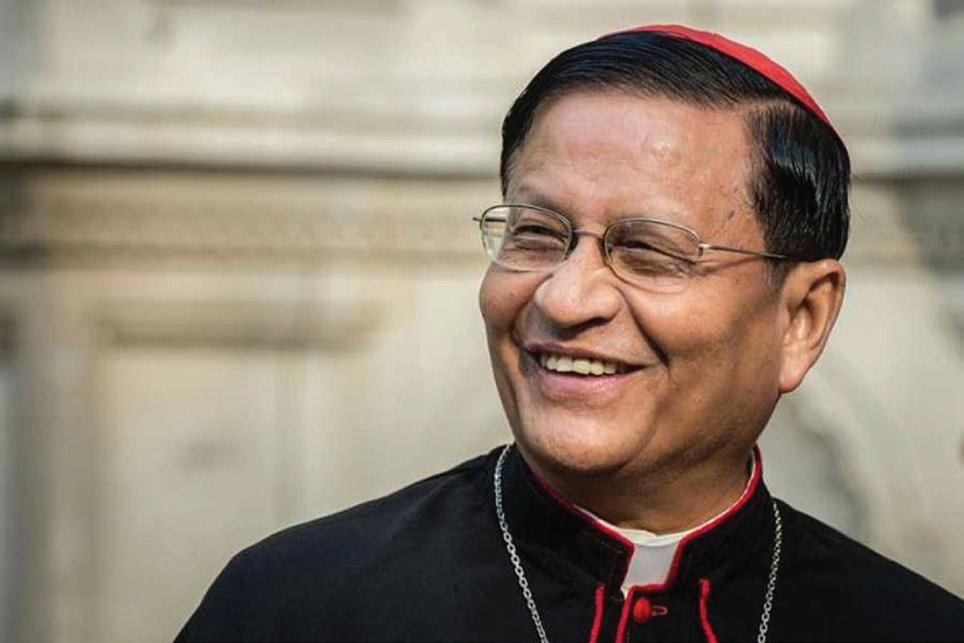
5 minute read
World News: Catholic groups aid recovery after Beirut explosion
WORLD NEWS highlights, upcoming events and briefs
Damage in downtown Beirut following an explosion at the city’s port.
Catholic groups aid recovery after Beirut explosion
Catholic News Agency
Following an explosion that killed more than 150 people in Beirut, international Catholic groups have responded by providing health services and necessities to the victims.
At least sixteen Catholic organizations, including Catholic Relief Services and Caritas International, have responded to the Aug. 4 explosion at Beirut’s port.
As victims in Beirut face an urgent need for shelter, medication, hygiene kits, and mental health services, these organizations have dispatched medical teams and relief groups to assist with basic necessities.
The explosion killed at least 154 people, and injured about 5,000 others. Beirut Governor Marwan Abboud estimated that the explosion has caused as much as $10- 15 billion in damages and as many as 300,000 people to be temporarily displaced from their homes, according to the BBC.
The fire started near the port’s large grain silos. It soon spread to a warehouse holding 2,750 tonnes of ammonium nitrate, a fertilizer made into an explosive.
Many buildings and warehouses along the docks were completely destroyed, and the explosion’s shockwave caused damage within a six-mile radius. The adjacent areas included Beirut’s mostly Christian neighborhoods of Mar Maroun and Achrafieh.
Despite damages to their own facilities, CRS has provided relief to the victims of the explosion. Caritas Lebanon has offered water and hot meals at several locations throughout Beirut. Caritas health care centers have also opened, and a mobile medical unit and mental health team have been available to the public.
“Our partners started working right away to make sure people were getting help, even though their own buildings were damaged in the explosion,” said CRS spokesperson Megan Gilbert.
“At CRS, we’re privileged to contribute to the overwhelmingly generous volunteer response of the Lebanese people, despite all that they have been through over the past year,” she said Aug. 6.
See full story at catholicnewsagency.com.
WORLD NEWS highlights, upcoming events and briefs
Coronavirus, vaccines, and Catholic ethics
By Matt Hadro
Catholic News Agency
Production for a new coronavirus vaccine is speeding along, but if one is developed to fight the pandemic, ethical questions remain about its development, and who should receive it first. There are many workers in health care and in the public sector who could be considered a priority to STOCK IMAGE VIA SHUTTERSTOCK receive any new vaccine, as they come into contact with many different people due to the nature of their profession, explained Edward Furton, ethicist and director of publications at the National Catholic Bioethics Center.
“All of those who come into contact with many different people through their ordinary line of work, they would be first in line,” Furton told CNA. People in this group might include first responders, physicians, nurses, other healthcare workers, police officers, and public transit employees.
Authorities should also consider prioritizing citizens living in crowded urban conditions, as “an effort to tackle the disease and the places where it’s most likely to spread,” he said.
Multiple vaccine candidates to fight the new coronavirus (SARS-CoV-2) are entering the latter phases of production and testing.
Catholics are discussing whether an obligation exists for one to receive a vaccine for SARS-CoV-2, if it is made available. And other ethical questions remain, such as the source of the vaccines being developed and the speed at which they are being produced.
Two bishops of the conference of England and Wales recently produced a paper on vaccination in light of the pandemic.
“We believe that there is a moral obligation to guarantee the vaccination coverage necessary for the safety of others. This is especially important for the discovery of a vaccine against COVID-19,” they said.
In 2017, the Pontifical Academy for Life addressed the issue of commonly used vaccines in a document.
The academy said that, in the case of commonly used vaccines against rubella, chickenpox, polio, and hepatitis

A, there exists a moral obligation for Catholic parents to vaccinate their children in light of possible threats to the vulnerable caused by a resurgence in the prevalence of the diseases. The academy said that “the moral obligation to guarantee the vaccination coverage necessary for the safety of others is no less urgent, especially the safety of more vulnerable subjects such as pregnant women and those affected by immunodeficiency who cannot be vaccinated against these diseases.”
However, those vaccines have been used for years, while a vaccine for the new coronavirus has yet to be fully developed, approved, and distributed.
One of the preeminent issues with current COVID vaccine candidates is whether or not they are being produced by using cell lines from aborted babies—something the Vatican has warned against in previous documents.
In the 2008 document Dignitas Personae, the Congregation for the Doctrine of the Faith said that researchers may not use biological material of “illicit origin,” or cell lines from aborted babies, in developing a vaccine.
Parents gravely concerned about their children’s health and have no other choice could use the vaccine, the CDF said, but must “make known their disagreement and ask that their healthcare system make other types of vaccines available.”
Some of the vaccines being developed to fight the new coronavirus are using the HEK-293 cell line, one commonly used in vaccines derived from aborted fetal tissue. The candidate being developed by the University of Oxford and AstraZeneca is using this cell line.
Other candidates do not use this cell line, such as one being developed by Sanofi Pasteur. The Moderna vaccine candidate does not rely on this HEK-293 cell line for production. Rather, it uses a Spike protein, the gene sequence of which was determined through testing that involved a HEK-293 cell line. The gene sequence was not determined by Moderna scientists, but was simply selected by the company as the target for the vaccine.
See full story at catholicnewsagency.com.










